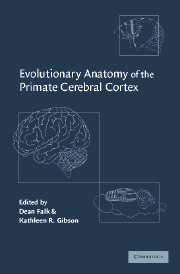Book contents
- Frontmatter
- Contents
- List of contributors
- Preface
- Prologue: Size matters and function counts
- Part I The evolution of brain size
- Introduction to Part I
- 1 Encephalization and its developmental structure: how many ways can a brain get big?
- 2 Neocortical expansion and elaboration during primate evolution: a view from neuroembryology
- 3 In defense of the Expensive Tissue Hypothesis
- 4 Bigger is better: primate brain size in relationship to cognition
- 5 The evolution of sex differences in primate brains
- 6 Brain evolution in hominids: are we at the end of the road?
- Part II Neurological substrates of species-specific adaptations
- Epilogue: The study of primate brain evolution: where do we go from here?
- Index
4 - Bigger is better: primate brain size in relationship to cognition
Published online by Cambridge University Press: 07 October 2011
- Frontmatter
- Contents
- List of contributors
- Preface
- Prologue: Size matters and function counts
- Part I The evolution of brain size
- Introduction to Part I
- 1 Encephalization and its developmental structure: how many ways can a brain get big?
- 2 Neocortical expansion and elaboration during primate evolution: a view from neuroembryology
- 3 In defense of the Expensive Tissue Hypothesis
- 4 Bigger is better: primate brain size in relationship to cognition
- 5 The evolution of sex differences in primate brains
- 6 Brain evolution in hominids: are we at the end of the road?
- Part II Neurological substrates of species-specific adaptations
- Epilogue: The study of primate brain evolution: where do we go from here?
- Index
Summary
Debates between Harry Jerison and Ralph Holloway enlightened and expanded our understandings of the evolution of the human brain and human mind for a period of several decades. Jerison argued that quantitative increases in neural tissue and in neural information processing capacity were the most important determinants of human intelligence (Jerison, 1973). Holloway took a seemingly contradictory stance, that the human brain had been reorganized in relationship to the brains of other primates and that this reorganization was the primary determinant of human mental capacities (Holloway, 1966). These debates have waned in recent years with the realizations that quantitative change and neural reorganization are not mutually exclusive phenomena. Indeed, in mammals, increased brain size correlates with or predicts various forms of brain reorganization including decreased neuronal density, increased ratios of connections to neurons, increased numbers of gyri and fissures, increased neuronal specialization, and increased size of the neocortex, cerebellum, hippocampus, corpus striatum, and diencephalon and other neural structures (Finlay & Darlington, 1995; Gibson & Jessee, 1999; Jerison, 1973, 1982, 1985). Increased numbers of neural processing units or ‘modules’ would also be expected to result in increased amounts of neural tissue (Preuss, Chapter 7, this volume).
These considerations suggest that among closely related mammalian species those with the larger brains may well have the greatest mental abilities. Not only will they have greater overall information processing capacities, but also, in many cases, they will have increased numbers of neural modules, increased size of the neocortex and of other higher neural processing areas, and increased neural connectivity.
- Type
- Chapter
- Information
- Evolutionary Anatomy of the Primate Cerebral Cortex , pp. 79 - 97Publisher: Cambridge University PressPrint publication year: 2001
- 26
- Cited by



